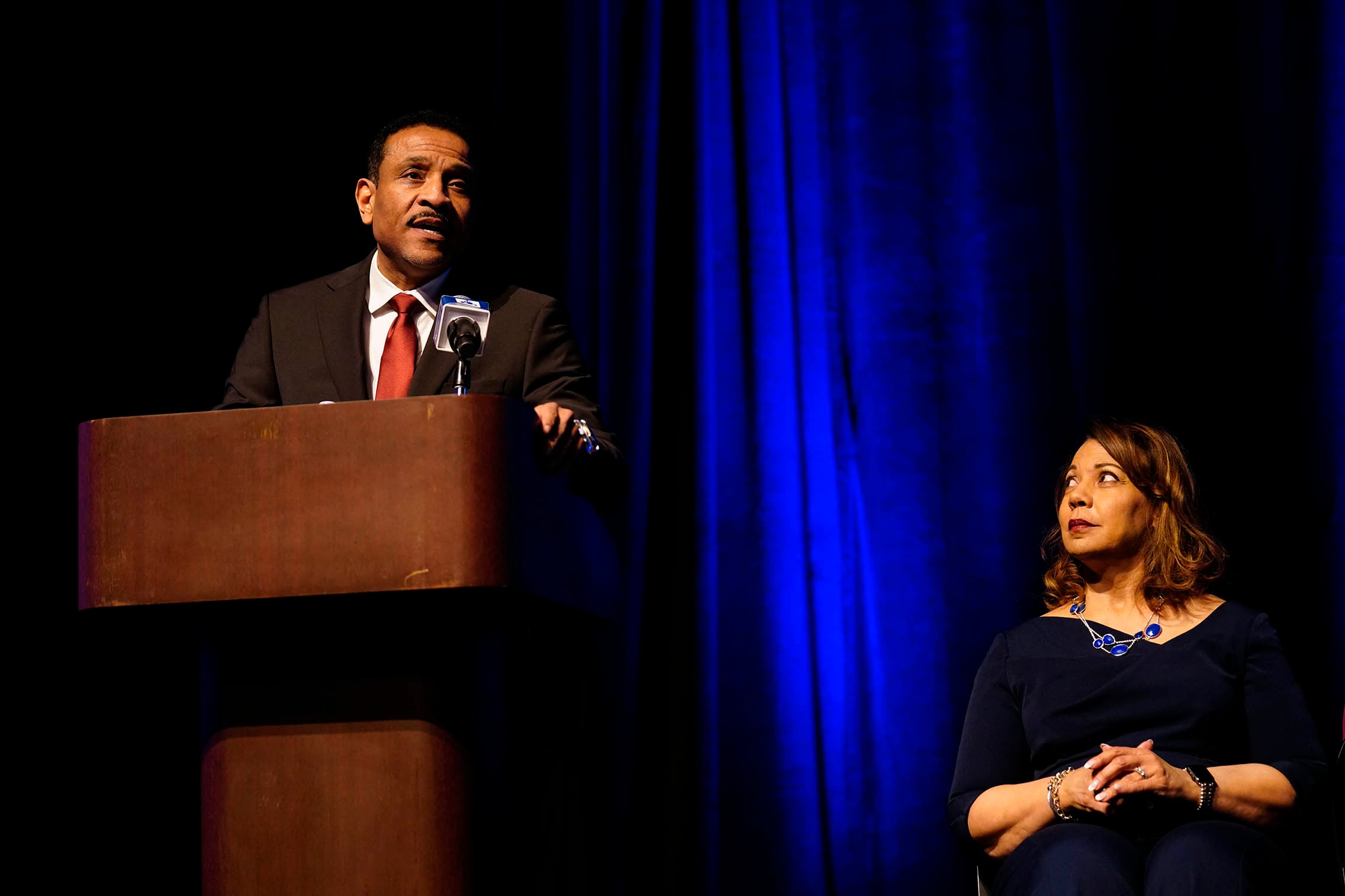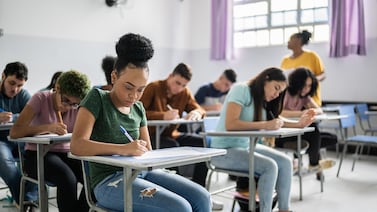Sign up for Chalkbeat Philadelphia’s free newsletter to keep up with the city’s public school system.
The “State of Public Education” in Philadelphia is not as strong as it could be, Superintendent Tony Watlington said in a sweeping address Tuesday.
In the first speech of its kind in Philadelphia, Watlington celebrated some incremental successes since he became superintendent in June 2022: Student attendance is up, the four-year graduation rate is up, dropouts are decreasing, and teacher attendance is also improving. But he cautioned that the district is facing many challenges, including a looming budget shortfall of more than $400 million, declining enrollment, low test scores, aging facilities, and a persistent teacher shortage.
With no ability to raise taxes on its own and with federal COVID aid set to run out, Watlington’s ability to appeal to representatives in Harrisburg and City Hall will be crucial to getting the chronically underfunded district more money to address different issues.
And Tuesday’s event — which began with remarks from Mayor Cherelle Parker and was attended by a host of state, federal, and local elected officials — was a public attempt to make the case for adequately funding Philadelphia students.
Watlington, who came to Philadelphia from North Carolina, said in an interview before the address that in his nearly two years leading the district, he has perceived a “crisis of confidence” in a city he described as “hard on itself.”
“All the children are not well, it is no secret,” Watlington said in his speech. Citing modest improvements in several areas, he added: “Is it enough? Absolutely not.”
Speaking at the Philadelphia High School for Creative and Performing Arts, Watlington presented data showing the district is improving on some markers from 2021-22 to 2022-23:
- Student attendance is up from 57% to 60%.
- The teacher attendance rate is up from 77% to 84%.
- The four-year graduation rate is up from 71% to 74%.
- The number of students who dropped out fell from 3,917 to 3,652.
But state test scores show students are still struggling in the classroom; even with small gains last year, most students are still scoring below proficient in reading and math. In Algebra I and Biology, performance has also declined post-pandemic; just one in five students scored proficient in Algebra I last year.
Watlington said he wants to “establish deep partnerships” with district families, caregivers, and community members, and be more transparent with budgeting.
Watlington’s presentation reiterated much of what he said when he finished out his first full year in office. But now, with Parker in charge, changes to the district may be coming.
Parker has expressed more openness to charter schools, which now educate a third of the city’s students. But the Board of Education has not approved a new charter school in six years, and it and the district’s charter office has been accused of racial bias in disproportionately moving to close charters that have Black leadership.
The first hint of a possible political shift on this issue came at last Thursday’s board meeting, when members reversed their previous decision not to renew the Southwest Leadership Academy charter school.
Parker’s presence at Watlington’s speech could signal she wants to take a more hands-on approach to public K-12 education than her predecessor, Jim Kenney. She has the power to appoint all nine members of the school board, and can remake it from scratch if she wants. Current board members’ terms expire on May 1.
So far, she has given no hints about her intentions, although she spoke well of Board President Reginald Streater.
Philadelphia mayor says ‘crumbles of funding’ are inadequate
Watlington said in his speech he is trying to prove to Parker, and to state and federal lawmakers, that under his leadership the district will be a responsible steward of any new funding. He highlighted decisions to reorganize his office, overhauling math and language arts curriculum, eliminating vacant positions, and shaking up his leadership team in an effort to trim administrative staff and focus more on crucial priorities like dropout prevention, facility improvements, and high-impact tutoring.
Parker pledged to work to bring more school funding to the city. She also called out elected leaders attending Tuesday’s event, including several members of Congress, state legislators like House Speaker Joanna McClinton, and City Council members including Council President Kenyatta Johnson.
Philadelphia’s children are “given crumbles of funding when they really do deserve a whole loaf” Parker said of the state’s current school funding system.
Parker commended Watlington for his five-year strategic plan, known as Accelerate Philly, which the school board adopted last year. But she said it’s the job of policymakers and elected officials to “make sure we have the dollars in order to get it done.”
Still, Parker cautioned that “this is going to be a tough year,” and expressed concern about whether city taxpayers should be expected to shoulder more of the burden for schools. She placed her faith in state education funding reform in the wake of last year’s Commonwealth Court decision that the current system is unconstitutional.
In her remarks at the event, Parker did go out of her way to express her continued support for another of her campaign platforms – year-round school, a potentially budget-busting initiative that would require massive union buy-in. In his speech, Watlington expressed some support for extending the school day and year.
The district’s presentation on Tuesday concluded with a “call to action” by Kathryn Epps Roberson, president and CEO of the Fund for the School District of Philadelphia — a source of private philanthropic funding for the district. Epps called Watlington’s five-year blueprint an “audacious approach” to school reform and improvement.
She also announced the Fund’s intent to raise $40 million by 2028 to support Watlington’s plan, including $6 million in year one.
“This has to be a public and private effort,” she said.
That money will provide stipends to people to participate in Parent University, an initiative Watlington intends to revive that helps parents shore up their skills and learn how to better help their children with schoolwork. It will also fund a high-impact tutoring pilot program in up to eight schools, help with teacher recruitment and training, and underwrite swimming programs, among other priorities.
Carly Sitrin is the bureau chief for Chalkbeat Philadelphia. Contact Carly at csitrin@chalkbeat.org.
Dale Mezzacappa is a senior writer for Chalkbeat Philadelphia, where she covers K-12 schools and early childhood education in Philadelphia. Contact Dale at dmezzacappa@chalkbeat.org.







